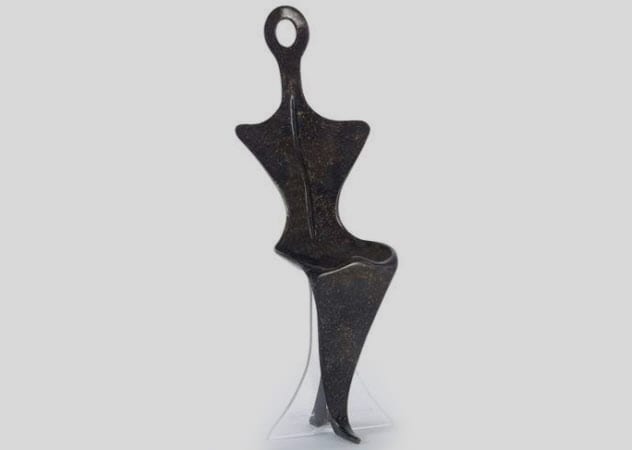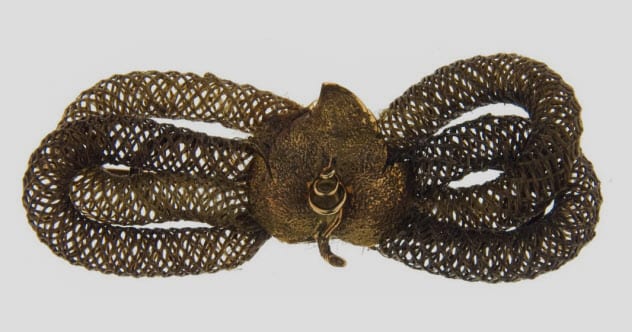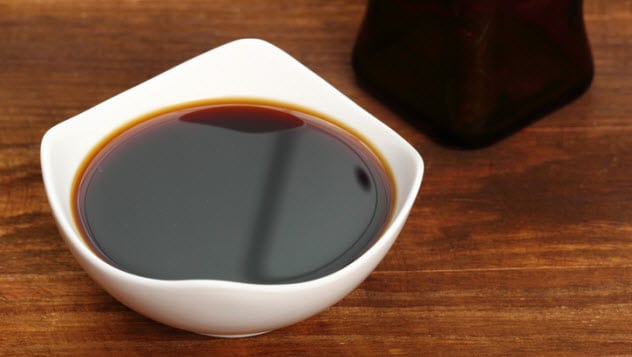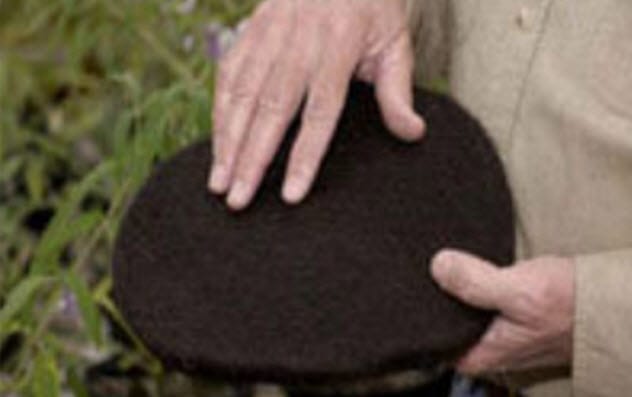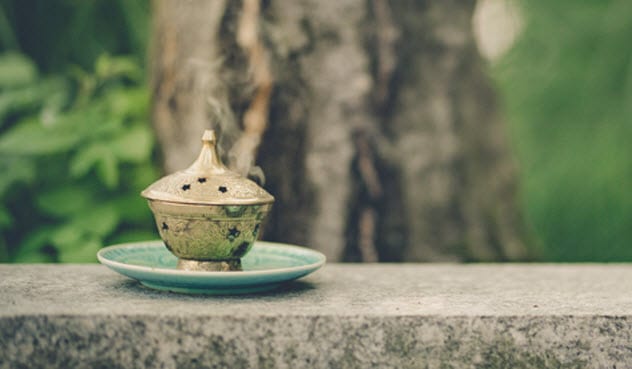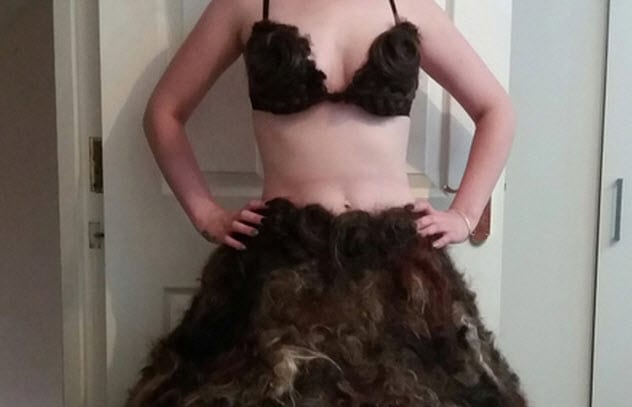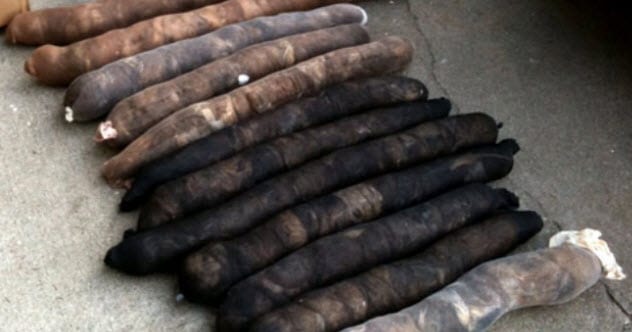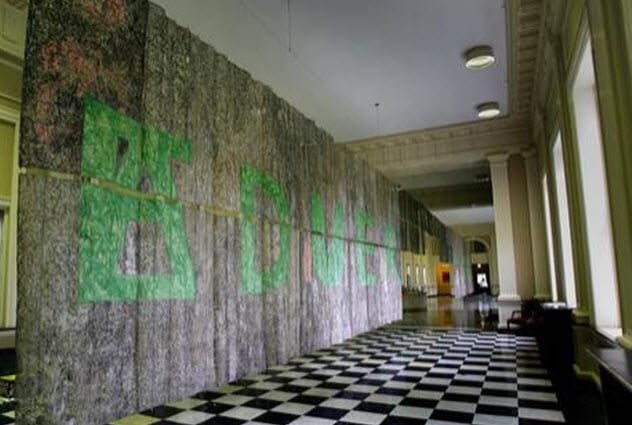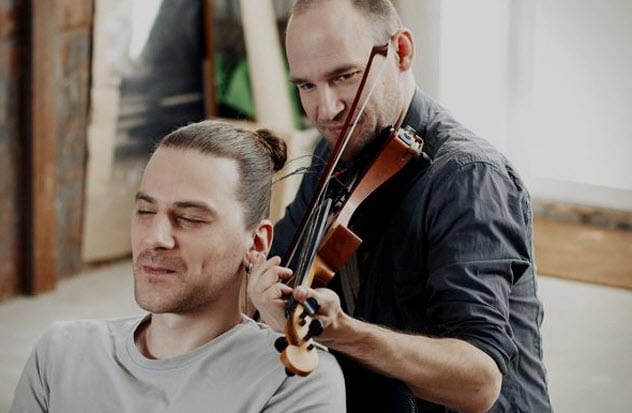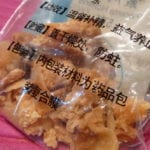Some of these methods are practical and benefit people, but others are just plain silly. Either way, they’re creative and push the limits of how we think about hair. Here is a list of 10 weird ways that human hair has been used in the past.
10 Hair Chair
Human hair is stronger than fiberglass, and one man found a way to use the strength of hair to create a functional consumer product. Ronald Thompson, an ex–hair stylist to the celebrities and superstars, created the “Stiletto Chair,” which was made mostly of human hair. The ex-hairdresser kept discarded hair that was swept up in barbershops and hair salons in London to create this chair. The chair prototype was made of 2 kilograms (4.5 lb) of hair. Thompson hopes that this unique alternative to fiberglass will be used in other consumer products such as shoes, clothing, and boat parts. “It is versatile, waterproof, non-conductive, corrosion-free, fire-resistant, tough, strong, durable, and is able to compete with products, such as medium-density fiberboard, fiberglass, polymers, and aluminum,” Thompson said.[1] The prototype chair was coated in bronze and put on the market for $15,000. But Thompson hopes to create less expensive models in the future.
9 Jewelry
The Victorians mourned the dead in a unique way. They created jewelry from the hair of dead relatives. After her husband, Prince Albert, passed away, Queen Victoria wore a locket of his hair around her neck. Victorians often made brooches or pendants with the hair woven in the middle. Hair jewelry may sound crazy today, but it was once considered both sentimental and fashionable. Hair jewelry showed your connection to someone who had passed away, but it was also used to show your connection to a living friend, child, or spouse. Many pieces of jewelry made from hair can be found at Leila’s Hair Museum in Missouri. According to its website, Leila’s is the only hair museum in the world and has over 2,000 pieces of jewelry made from human hair. Each piece of jewelry tells a story and often has the name, birth date, and death date of the hair’s owner on the piece.[2]
8 Soy Sauce
A Chinese company started promoting powders and liquid made from human hair as a new ingredient for soy sauce. Human hair is known to be rich in protein content, just like soybeans, wheat, and bran. The company said that the powder and liquid made from hair contained an amino acid that would be used to make soy sauce. They shipped the ingredients to soy sauce factories around the country.[3] Workers of the company sorted human hair from dirty bags, placed it in a machine without cleaning the hair, and created the powder and liquid. Health officials warned that using the hair could be dangerous. Government officials said that human hair contains lead and arsenic, which could be harmful to the liver, kidneys, and bloodstream. It could even cause cancer.
7 Helps To Grow Food
Human hair has also been used as a fertilizer and weed deterrent. Hair fertilizer has even been compared to chemical fertilizer. A company named Smart Grow uses human hair to create a mat that works as an organic growth aid when placed at the base of a plant and as a weed deterrent when placed aboveground. The hair mat allows growers to avoid using fertilizers or herbicides containing harsh chemicals.[4] The company was founded by Phil McCrory, who was a former hairstylist. He got the idea after trying to find a use for all the hair that he swept up at work. Using human hair as a fertilizer isn’t something new, though. Ancient Chinese farmers used human hair and excrement to feed their crops.
6 Incense
If you have ever smelled burning hair, then you understand that it isn’t the most pleasant smell. However, people in ancient India were known to use hair in their incense. To satisfy demons and spirits, they burned human hair mixed with ginger, fragrant leaves, or aromatic gums to create a pleasant aroma. They tried this when the spirits were doing something that the ancient Indians didn’t like. Another type of incense was created by mixing human hair with something nastier, like pig manure. The goal was to make the demons flee from the terrible smell.[5]
5 Pest Control
Human hair has been used for centuries for pest control in the United States, India, and China. Not only will human hair work as a fertilizer, but it can also keep animals from sneaking into your garden. Hair will mostly deter snails, rodents, rabbits, and deer. But you can tie cheesecloth or nylon bags filled with unwashed hair to posts near or inside gardens to deter other types of animals. The hair used to deter animals will lose its scent within two weeks and should be replaced frequently. It is said that you can mix dog or cat hair with human hair for your garden, and it will be just as or even more effective.[6] If you are looking for an easy and inexpensive way to keep those pests out of your garden, turn to hair!
4 Clothing
It would appear to be itchy, but hair has even been used to create clothes. Bill Black was a barber who created items from the hair that he collected from customers. One of his creations was a bikini made from human hair. His bikini resembled a normal bikini, and the size was close to a B cup. His wife tried it on and complained that it was too itchy—no surprise there. Black also created penny loafers, underwear, hats, shirts, and vests from human hair.[7] A more disturbing version of clothes made from human hair came from 28-year-old Sarah Louise Bryan. She created a top and skirt from pubic hair and tried to sell them for around $13,000. It took her six months to create the clothes. She started with a thin, steel material and stuck the hair on it with hot glue. Luckily, she sterilized the hair first and used hot water to kill any bacteria.
3 Clean Up Oil Spills
Remember Phil McCrory, the former hairdresser who created the hair mat to help fertilize plants? He also came up with the idea of using hair to clean up oil spills. He noticed an otter’s fur was saturated with oil after the 1989 Alaska oil spill and thought to himself, “If animal fur can trap and hold spilled oil, why can’t human hair?”[8] To test the idea, McCrory stuffed 2.2 kilograms (5 lb) of human hair inside a pair of his wife’s pantyhose. He tied the ankles of the hosiery together to form a ring shape. Then he filled his son’s wading pool with water and dumped used motor oil in the middle. He pulled the legs of the hosiery ring together, and the oil adsorbed onto the hair inside it. The oil gathered in layers on the hair’s surface, allowing for an easy recovery of the oil so that it could be reused. McCrory worked with NASA to test his product under controlled laboratory conditions. Tests showed that 4 liters (1 gal) of oil can be adsorbed in less than two minutes using his method. They also found that it could save money on cleanup costs. McCrory is a genius when it comes to finding uses for human hair.
2 Work Of Art
Human hair has also been used for many years to create various forms of art around the world. You read earlier that hair was used in Victorian times to create jewelry. As shown in Leila’s Hair Museum, it has been used to create hair wreaths, bracelets, necklaces, earrings, hat pins, cuff links, buttons, and more. Even though hair art flourished in Victorian times, it has been used more recently to create contemporary art. A massive banner of human hair was stretched across Dartmouth College’s Baker-Berry Library. The 24-meter (80 ft) by 4-meter (13 ft) piece of art used 190 kilograms (420 lb) of human hair that was collected from 42,000 haircuts.[9] It took several months to collect the hair from the students, faculty, and staff of Dartmouth as well as local residents. The banner’s “green house” title and green lettering symbolized money and showed that education and capitalism are inseparable.
1 Musical Instruments
One of the musical instruments found among the Mangyans, the indigenous people from the Philippines’ island of Mindoro, is the gitgit. The gitgit is a three-stringed violin that contains human hair for the strings. This instrument was used by a male attempting to woo a female. He played it to announce his arrival at the woman’s house. Many instruments were once stringed with human hair, but there have also been more contemporary uses for hair with instruments. Tadas Maksimovas is an experimental artist who allows an instrument to be played with his own hair that is still connected to his head! He uses his hair to make an experimental instrument for a performance called Hair Music (The Experiment).[10] He glues his waist-long hair into fibrous strands that are wrapped around a violin’s tuning pegs and stretched out like normal strings. Then musician Eimantas Belickas slides his bow across Maksimovas’s hair instrument. The musical art project is fun, but Maksimova has to lose his long locks of hair at the end. It is a small price that the artist pays for his art. I’m just another bearded guy trying to write my way through life. Visit me at www.MDavidScott.com.
